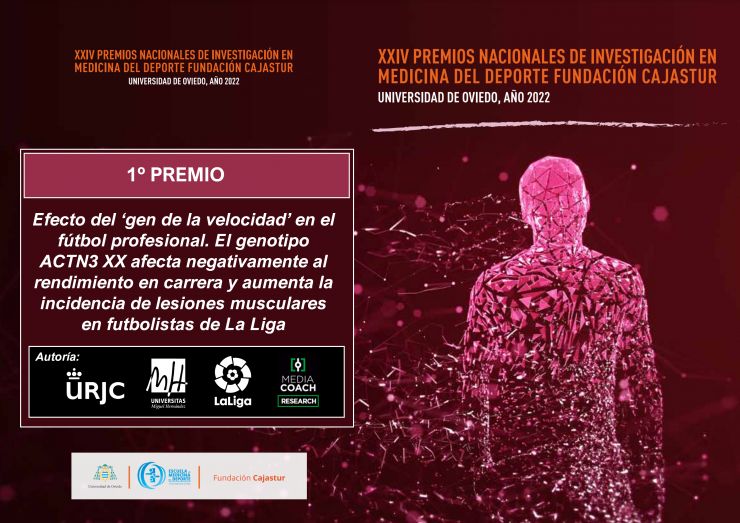Institutional
LUN 03.04.2023
The paper entitled: “Effect of the speed gene in professional football. The ACTN3 XX genotype
The physical performance data was obtained through Mediacoach, the performance analysis and video analysis platform developed by LaLiga and made available to the 42 clubs by the organisation. In order to obtain the genetic samples, the medical services of 11 LaLiga Santander clubs were involved: DNA samples were extracted from the players of these clubs to determine the genotype they had in the so-called speed gene, together with analysis of their injury record, which was also provided by the medical services.
The players’ data was processed in anonymized form and categorised into three groups according to their genotype in the ACTN3 gene: those with the XX genotype who do not produce the α-actinin-3 protein, a key protein in muscle fibre, those who produce the protein and have the RR genotype, and those who produce the protein in an intermediate amount because they have the RX genotype.
“This work provides new information on the role of genetics in the physical performance and injury probability of professional football players. Although we have analysed only one gene out of the 30,000 we have in our DNA, we have been able to determine that a small variation in DNA can cause some footballers to have a lower physical performance during matches and a higher risk of muscle injury. This does not mean that footballers with the XX genotype in the speed gene have a worse chance of being elite footballers than RR or RX, because they may have exceptional technical or tactical qualities that are not associated with this gene. For us, the findings of the work indicate that genetic information may be fundamental for individualised training and injury prevention programmes, so that XX players can be trained in a specific way. Furthermore, it is important to point out that genetic information is one more piece of data to understand the potential of a professional player, and should not be used as a tool for talent selection, especially in football, which is such a complex sport and has so many factors that determine whether a player can reach the level to become a professional player,” says Dr Juan Del Coso, researcher at the Centre for Sports Studies at the Rey Juan Carlos University.
“This finding is of great importance for club professionals to carry out specific prevention programmes and special physical performance improvement plans for players with this genetic mutation. It also allows clubs and their coaching staff to conduct tailor-made recovery programmes and match schedules to minimise the risk of injury,” states Ricardo Resta, director of the Mediacoach Department at LaLiga and one of the participating researchers.
A priority: protecting the health of players
For more than four years, the group of researchers led by Dr. Del Coso and in which Dr. Victor Moreno-Perez (Miguel Hernández University), Ricardo Resta Serra and Dr. Roberto López del Campo (both from the Sports Research Department of LaLiga) also participated on a permanent basis, have already published two more studies on injury prevention in prestigious international journals.
The first, “Influence of the Weekly and Match-play Load on Muscle Injury in Professional Football
All three studies demonstrate the importance of a scientific approach to handling and interpreting data. LaLiga, in collaboration with universities and the medical teams at the clubs, has placed special emphasis on working hand in hand with scientists and universities in recent years, to promote the development of knowledge and new technological tools that help club professionals to optimise decision-making with the aim of reducing the risk of player injuries as much as possible.
Along these lines of innovation, the Video Review System was launched in all the competition's stadiums during the last matchday. This service is part of the Mediacoach suite of solutions and has been developed thanks to the Beyond Stats powered by Microsoft project. It is a system that allows the monitoring of everything that happens on the field through the management and control of the television feed and has a double function: technical-tactical and medical. Thus, the system helps medical services to make effective intervention in the event of a possible injury (especially in the case of concussions) thanks to the real-time review from various angles of play and positioning, which helps to determine better diagnosis and treatment.
© LALIGA - 2023


